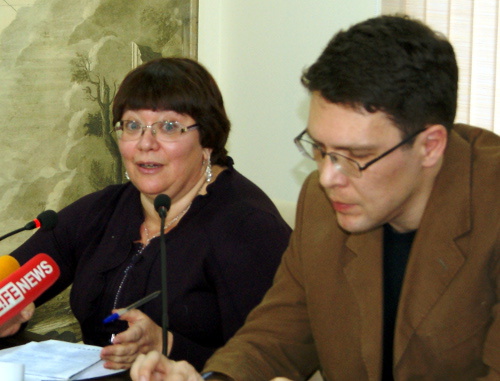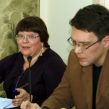
Russian Experts Warn of Social Implosion if Government Sticks to Crude Force in the North Caucasus
Publication: Eurasia Daily Monitor Volume: 11 Issue: 11
By:

On January 14, an expert report on the current situation and future evolution of the North Caucasus was released in Moscow. The report scathingly criticizes Russian government policies in the region and describes region as being in a state of ongoing crisis. Unlike many other previous expert reports on the North Caucasus, this one was prepared by experts from the influential Gaidar Institute Economic Policy, Irina Starodubrovskaya and Konstantin Kazenin. The presentation of the report was organized by the Committee of Civil Initiatives, which is led by ex-Minster of Finance Alexei Kudrin (https://polit.ru/article/2014/01/14/caucasus/).
Commenting on the section of the report devoted to Russia’s flawed counterterrorist practices, Yekaterina Sokiryanskaya, head of the Russian branch of International Crisis Group (ICG), said: “Normally, this theme, which is key to understanding the conflict in the North Caucasus, is covered by human rights activists. This report introduces the theme of the counterterrorist policies to the Russian mainstream expert community, and that is very important” (https://www.kavkaz-uzel.ru/articles/236666/).
The report combines general conclusions with vivid descriptions of specific cases. For example, the authors of the report argue that the dichotomous official division of Islam into “traditional” and “non-traditional” does not correspond with reality, which is much more complicated. Russia authorities support “traditional” Islam against “non-traditional” thereby violating the Russian constitution’s guarantee of fundamental religious freedom. Adherents of “non-traditional” Islam are viewed as militants and persecuted, whether or not they are militant extremists. The authors of the report cite the example of the village of Khojalmakhi in Dagestan, where locals self-organized into militia groups with government support “to fight the Wahhabis.” The village, which has a population of 10,000, had 33 Salafist residents. After the anonymous publication of the names of the Salafis, some of them were killed, while others fled the village. Their houses were looted. One Salafi was killed by a mob at a local mosque while he was in the process of “repenting,” because people did not like his repentance (https://polit.ru/article/2014/01/14/caucasus/).
Viktor Kazantsev, Moscow’s former envoy to the North Caucasus and a Russian general during the Russian-Chechen wars, called on the current envoy, Alexander Khloponin, to respond to the report. Kazantsev said that the report was compiled by “liberals,” and that the Russian government has to respond to the challenge (https://novayagazeta-ug.ru/news/u2210/2014/01/16/34739).
Interestingly, the authors of the report note that the number of attacks in the North Caucasus started to decline after 2010. However, contradicting the explanations given by Russian law enforcement agencies, they say the trend is not the result of improvements in the security services, but of the creation of adaptation commissions, special institutions created by the authorities to reintegrate back into society former militants who voluntarily renounce violence, in the violent republics of the North Caucasus (https://polit.ru/article/2014/01/14/caucasus/).
The report outlines three possible scenarios for future developments in the North Caucasus. Under the Inertial Scenario, Moscow will concurrently dispatch “doves” and “hawks” to rule the North Caucasus. After the implementation of several large projects, modernization efforts will stall because of a lack of resources and the manifest inefficiency of this approach. Violence will continue and the government will have more incentives to revert to crude force. Conflicts over land ownership will intensify. Young people leave the region for Moscow, St. Petersburg and other areas, which will result in increased xenophobia in other Russian regions and a drain of resourceful young people from the North Caucasus.
The Crude Force Scenario could result if the government decides to emphasize force. Social implosion and civil war are the most probable consequences of such policies, according to Starodubrovskaya and Kazenin. Finally, the Civil Reconciliation Scenario, favored by the authors of the report, envisages Moscow’s supporting civil dialogue, the direct election of republican governors, the re-introduction of militants to civilian life, government support for existing successful economic endeavors, land ownership reform and other similar steps (https://polit.ru/article/2014/01/14/caucasus/).
The proposals of Starodubrovskaya and Kazenin for resolving the conflict in the North Caucasus look plausible by themselves. However, their plausibility in the context of current Russian politics is highly dubious, given that Russia proper also lacks civil dialogue, rule of law, electoral democracy and number of other attributes that the experts propose for improving the situation in the North Caucasus.
Even more fundamentally, the question is whether Moscow actually wants the North Caucasus to flourish as a developed region. Fears of North Caucasian separatism are unlikely to subside in Russia any time soon. The so-called Inertial Scenario is not a sign of vacillation or “chaotic” Russian policy, but a more or less coherent approach to the region. The combination of “carrots” and “sticks,” with the prevalence of the latter, is expected to root out the rebellious element, induce mass migration from the region and effectively “dissolve” North Caucasian ethnicities in the Russian Federation. Moscow’s current plan for the North Caucasus does not envision a sound economy in the near future. Rather, it aims to “pacify” the region first, and only then develop the economy. However, the Russian government’s unexpected and vexatious inability to mix the populations as easily as it once could puts a check on the Inertial Scenario. Moscow may start looking for alternative approaches as some quarters of the Russian elite grow frustrated with the Kremlin’s current strategy.




